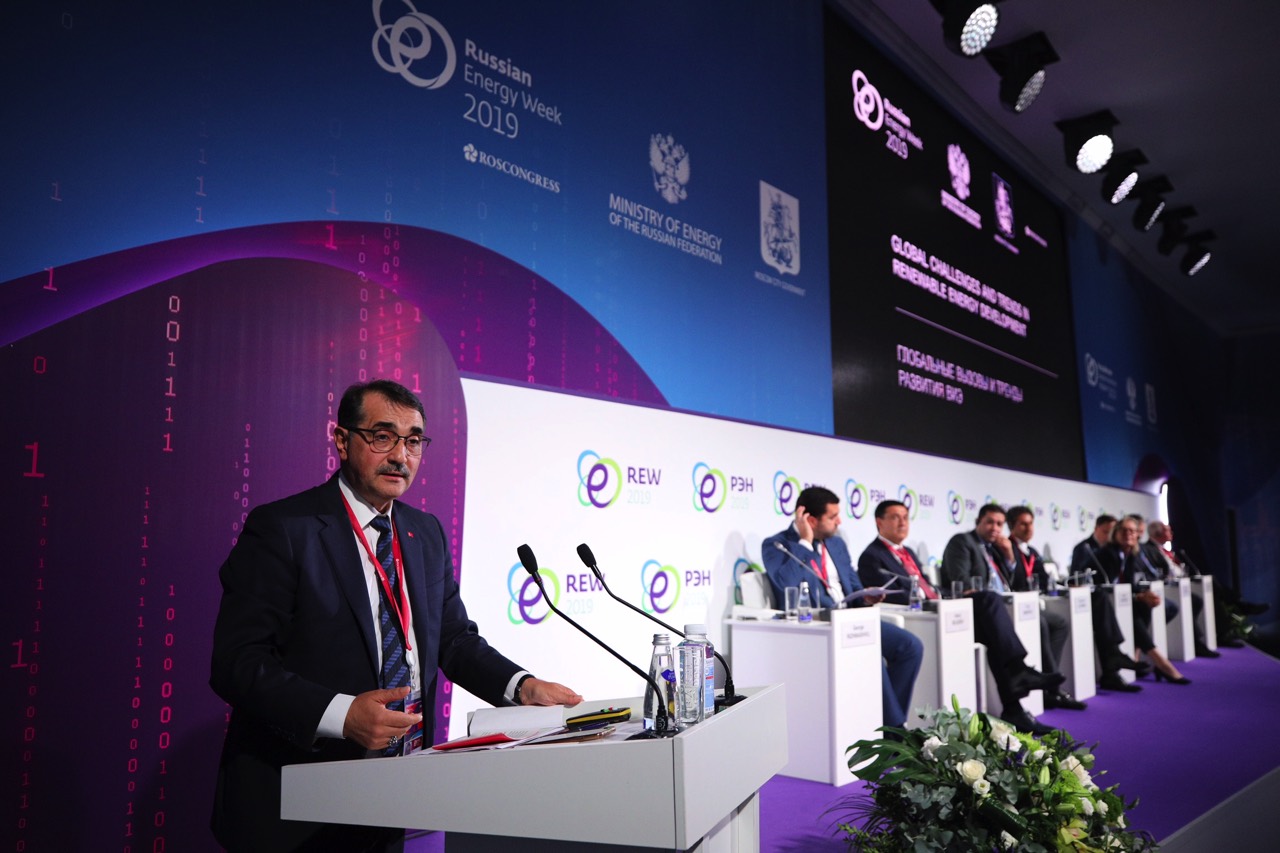Turkey, Russia relations boosted via energy projects
Turkey's Energy and Natural Resources Minister underlines importance of domestic and renewable resources

Turkey and Russia's bilateral relationship has been elevated through long-term cooperation projects including the TurkStream natural gas pipeline project, and the Akkuyu Nuclear Power Plant, Fatih Donmez, Turkey's energy and natural resources minister said on Wednesday.
During the Global Challenges and Trends in Renewable Energy Development session at Russian Energy Week conference in Russian capital Moscow, Donmez commended this cooperation that he said reflects both countries' mutual trust and understanding.
Both the TurkStream natural gas pipeline project and the Trans-Anatolian Natural Gas Pipeline (TANAP) have formed the backbone of Turkey's regional energy politics. These projects have enhanced energy supply security of Turkey and Europe through both route and supply diversification, he said.
He referred to the global energy sector's transition which he explained was not just based on economics or politics but which is also influenced by new technologies.
Accordingly, he said in order to move from conventional energy resources, new regulations, policies, financing models, including tariff mechanisms and offer guarantees, have a vital role to play in this evolution.
At the heart of this transition for Turkey, energy sources like nuclear, natural gas, coal and renewables will be on the agenda, Donmez noted.
Renewables, in particular, have become much cheaper compared with other sources of electricity generation with more competitive set-up costs in installation, equipment and infrastructure while also providing greater efficiency, he said.
"I believe this trend will continue in the near future, specifically for solar technology. The fall in the cost of electricity from renewables has transformed the choice of many policymakers," he said.
Nonetheless, he added that although renewable energy sources have made great progress in recent years, they still face major challenges.
"Some are associated with various renewable energy technologies, and others are due to factors such as undeveloped market conditions, inconsistent regulations and insufficient infrastructure. Therefore, a successful system integration and the energy sector transformation towards higher shares of renewable energy will be of utmost importance for policymakers." he explained.
- Turkey's energy sector
Donmez emphasized that Turkey's energy sector has been in transition since 2002, when it initiated the liberalization of its energy markets.
"Being an emerging economy and a key country in its region, Turkey's energy sector can be characterized by two factors: rapid demand growth and import dependency," he said.
As a result, he explained that one of Turkey's top priorities is to decrease its import dependency by improving security of supply and by maximizing renewable energy sources.
He said that Turkey aims at increasing the share of the domestic and renewable energy up to two thirds of the electricity production by 2023.
Since 2002, Turkey's installed capacity has grown from 32 gigawatts (GW) to 91 GW with 49% of this additional capacity based on renewables.
The second phase of the country's transformation was launched in 2017 with the National Energy and Mining Policy to become more self-sufficient, promote renewables and ramp up local resource utilization.
Donmez said that Turkey’s goal is to develop 10 GW of additional capacity in solar and wind energy each by 2026 compared to 2016.
"Ensuring security of supply, localization and predictable market conditions are the main pillars of this policy. Renewable energy emerges as an integral element cross-cutting these three pillars. Localization is also one of the vital pillars of our strategy," he explained.
Through Turkey's newly-established Renewable Energy Zone model, he said the country is prioritizing the local supply chain and transfer of technology through this tender mechanism.
He explained that in this context, competitive tenders of 1 GW for mega projects for each solar PV and wind energy generation plants were organized in 2017. In May, tenders for 1 GW capacity of wind were successfully initiated and new projects for renewable energy will be launched in 2020.
"As part of the localization pillar of our policy, other domestic sources such as coal still retain a significant portion in meeting growing energy demand in parallel with the global trend," he said.
However, he detailed that clean coal technologies should be supported with new research and development and to this end, he said Turkey would initiate a model similar to renewable tenders for clean coal technologies.
"We are committed to benefiting from our country's huge coal reserves in compliance with environmental regulations," he said.
He hailed the progress achieved to date in projects that have contributed to peach and stability.
"In light of the progress we have achieved, I can clearly say that despite all geopolitical tensions and difficulties, Turkey has achieved a regulatory framework with a transparent and competitive market structure, and has taken steps to promote private sector investments.
"Political stability and good governance have eased the movements of private sector investments in the field of energy so Turkey can continue to be a safe harbor and a leading actor in its region for investments," he said.



